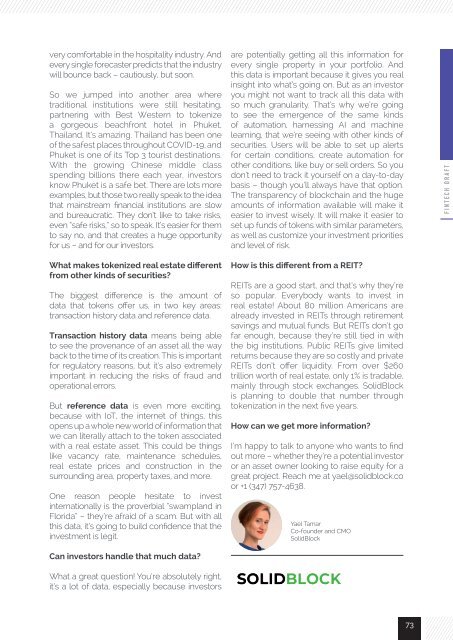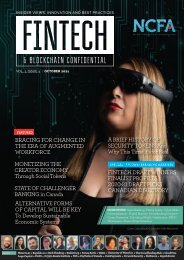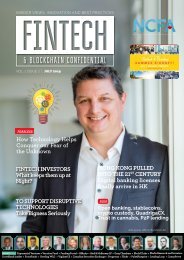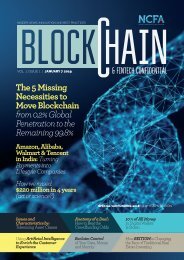NCFA Fintech Confidential December 2020 (Issue 3)
The National Crowdfunding & Fintech Association of Canada (NCFA) and partners are excited to present Vol. 1 Issue 3, FINTECH CONFIDENTIAL, a digital pop-up of the 6th annual 2020 Fintech & Financing Conference and Expo (FFCON20) held virtually across themed 8 weeks from July 9 to August 27 and co-hosted by NCFA and Toronto Finance International. The main theme of FFCON20 was “RISE”, reflecting the joint efforts of the two associations, NCFA and TFI, to build and increase the success and sustainability of Canada’s fintech and financial sector. There were many moving parts this year and a brand-new digital format with the event bringing together 100+ thought leaders, 50+ partners, and more than 500 attendees, 2 challenges and the inaugural Fintech Draft pitching and demo competitions. Congratulations to the winners: SolidBlock and MazumaGo (formerly DivDot)! Thanks to all the partners, speakers, attendees, volunteers and the entire organizing team for making FFCON20 an impactful and amazing online experience for Canada’s fintech and funding community. We hope you enjoy this issue of Fintech Confidential magazine – it certainly makes for great holiday reading! While everyone relentlessly strives to achieve success in 2021, we encourage you to bring in the new year with good health and to be mindful that we are all in this together, and to help others in your community more than ever before. Peace, happiness, and best wishes for an incredible year and journey ahead.
The National Crowdfunding & Fintech Association of Canada (NCFA) and partners are excited
to present Vol. 1 Issue 3, FINTECH CONFIDENTIAL, a digital pop-up of the 6th annual 2020 Fintech & Financing Conference and Expo (FFCON20) held virtually across themed 8 weeks from July 9 to August 27 and co-hosted by NCFA and Toronto Finance International.
The main theme of FFCON20 was “RISE”, reflecting the joint efforts of the two associations, NCFA and TFI, to build and increase the success and sustainability of Canada’s fintech and financial sector. There were many moving parts this year and a brand-new digital format with the event bringing together 100+ thought leaders, 50+ partners, and more than 500 attendees, 2 challenges and the inaugural Fintech Draft pitching and demo competitions. Congratulations to the winners: SolidBlock and MazumaGo (formerly DivDot)! Thanks to all the partners, speakers, attendees, volunteers and the entire organizing team for making FFCON20 an impactful and amazing online experience for Canada’s fintech and funding community.
We hope you enjoy this issue of Fintech Confidential magazine – it certainly makes for great holiday reading! While everyone relentlessly strives to achieve success in 2021, we encourage you to bring in the new year with good health and to be mindful that we are all in this together, and to help others in your community more than ever before. Peace, happiness, and best wishes for an incredible year and journey ahead.
You also want an ePaper? Increase the reach of your titles
YUMPU automatically turns print PDFs into web optimized ePapers that Google loves.
very comfortable in the hospitality industry. And<br />
every single forecaster predicts that the industry<br />
will bounce back – cautiously, but soon.<br />
So we jumped into another area where<br />
traditional institutions were still hesitating,<br />
partnering with Best Western to tokenize<br />
a gorgeous beachfront hotel in Phuket,<br />
Thailand. It’s amazing. Thailand has been one<br />
of the safest places throughout COVID-19, and<br />
Phuket is one of its Top 3 tourist destinations.<br />
With the growing Chinese middle class<br />
spending billions there each year, investors<br />
know Phuket is a safe bet. There are lots more<br />
examples, but those two really speak to the idea<br />
that mainstream financial institutions are slow<br />
and bureaucratic. They don’t like to take risks,<br />
even “safe risks,” so to speak. It’s easier for them<br />
to say no, and that creates a huge opportunity<br />
for us – and for our investors.<br />
are potentially getting all this information for<br />
every single property in your portfolio. And<br />
this data is important because it gives you real<br />
insight into what’s going on. But as an investor<br />
you might not want to track all this data with<br />
so much granularity. That’s why we’re going<br />
to see the emergence of the same kinds<br />
of automation, harnessing AI and machine<br />
learning, that we’re seeing with other kinds of<br />
securities. Users will be able to set up alerts<br />
for certain conditions, create automation for<br />
other conditions, like buy or sell orders. So you<br />
don’t need to track it yourself on a day-to-day<br />
basis – though you’ll always have that option.<br />
The transparency of blockchain and the huge<br />
amounts of information available will make it<br />
easier to invest wisely. It will make it easier to<br />
set up funds of tokens with similar parameters,<br />
as well as customize your investment priorities<br />
and level of risk.<br />
FINTECH DRAFT<br />
What makes tokenized real estate different<br />
from other kinds of securities?<br />
The biggest difference is the amount of<br />
data that tokens offer us, in two key areas:<br />
transaction history data and reference data.<br />
Transaction history data means being able<br />
to see the provenance of an asset all the way<br />
back to the time of its creation. This is important<br />
for regulatory reasons, but it’s also extremely<br />
important in reducing the risks of fraud and<br />
operational errors.<br />
But reference data is even more exciting,<br />
because with IoT, the internet of things, this<br />
opens up a whole new world of information that<br />
we can literally attach to the token associated<br />
with a real estate asset. This could be things<br />
like vacancy rate, maintenance schedules,<br />
real estate prices and construction in the<br />
surrounding area, property taxes, and more.<br />
One reason people hesitate to invest<br />
internationally is the proverbial “swampland in<br />
Florida” – they’re afraid of a scam. But with all<br />
this data, it’s going to build confidence that the<br />
investment is legit.<br />
Can investors handle that much data?<br />
What a great question! You’re absolutely right,<br />
it’s a lot of data, especially because investors<br />
How is this different from a REIT?<br />
REITs are a good start, and that’s why they’re<br />
so popular. Everybody wants to invest in<br />
real estate! About 80 million Americans are<br />
already invested in REITs through retirement<br />
savings and mutual funds. But REITs don’t go<br />
far enough, because they’re still tied in with<br />
the big institutions. Public REITs give limited<br />
returns because they are so costly and private<br />
REITs don’t offer liquidity. From over $260<br />
trillion worth of real estate, only 1% is tradable,<br />
mainly through stock exchanges. SolidBlock<br />
is planning to double that number through<br />
tokenization in the next five years.<br />
How can we get more information?<br />
I’m happy to talk to anyone who wants to find<br />
out more – whether they’re a potential investor<br />
or an asset owner looking to raise equity for a<br />
great project. Reach me at yael@solidblock.co<br />
or +1 (347) 757-4638.<br />
Yael Tamar<br />
Co-founder and CMO<br />
SolidBlock<br />
73






